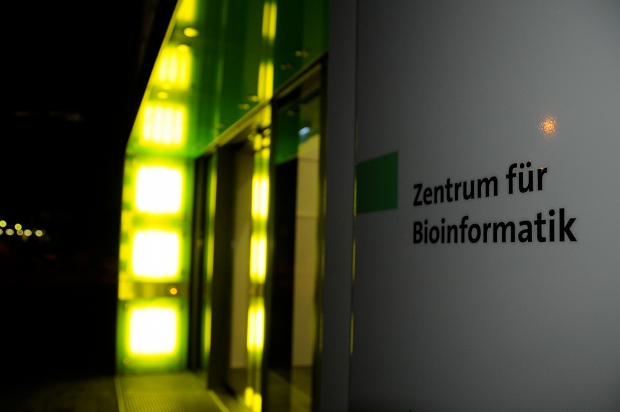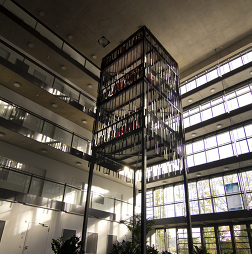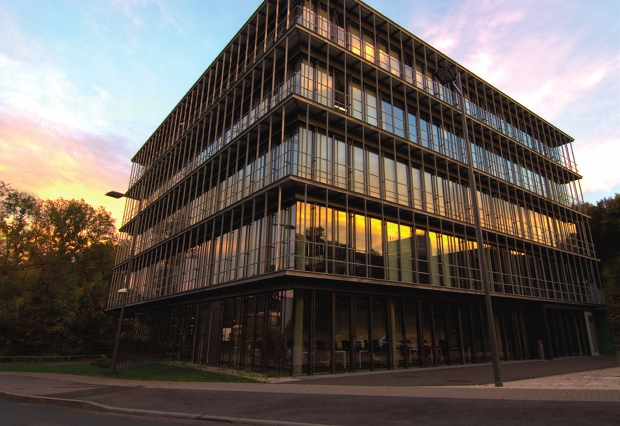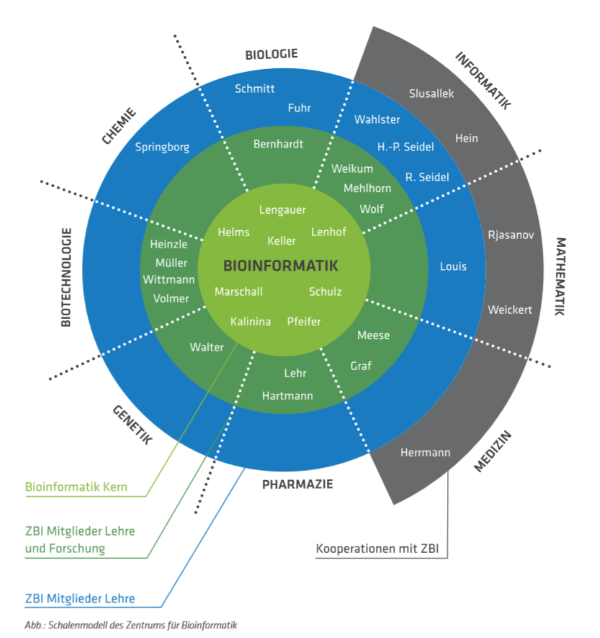About the CBI
April 12, 2023 2023-05-31 11:03About the CBI
The Center for Bioinformatics in Saarbrücken
The Center for Bioinformatics (CBI) Saar was founded in 2001 as a scientific institution of Saarland University (§29 university law) and received funding from the German Research Foundation (DFG) until 2009. In the following, you will find information about its goals and history, as well as its composition and statutes.
A much more detailed introduction and further information can be found in our report from 2015 (in German).

Introduction
 The Center for Bioinformatics Saar (CBI) engages in research and teaching in a highly modern area of science and is a model institution for interdisciplinary research on the campus of Saarland University (UdS).
The Center for Bioinformatics Saar (CBI) engages in research and teaching in a highly modern area of science and is a model institution for interdisciplinary research on the campus of Saarland University (UdS).
Bioinformatics or computational biology — we use the two terms interchangeably — is an interdisciplinary scientific field with contributions from biology and informatics, but also from medicine, chemistry, pharmaceutics, physics, and mathematics. The object of bioinformatics is the application of computer technology to the configuration of high-tech experiments in the life sciences as well as “especially” to the analysis of the voluminous and complex data sets that are generated by such experiments.
The first draft of the sequence of the human genome 15 years ago was a milestone of biology. The biology field has been transformed from a discipline at a mostly descriptive or qualitative level to a quantitative science. However, inferring biological processes in living organisms from genome sequences has proven to be considerably more difficult than initially expected.
Living organisms, all of which have developed evolutionarily, are highly complex and are not designed to be easily understood. High-dimensional genetic and molecular-biological data that afford a deeper understanding of the complex biological processes can only be analyzed with the aid of computers. Thus, in the past two decades, bioinformatics has become an essential part of the life sciences and biotechnology.
Goals
At the core of the Center for Bioinformatics Saar is an interdisciplinary team of scientists who jointly work towards the following goals:
- Excellent research in the area of bioinformatics, pertaining both to the computer-based methodology and to its application in biology, pharmaceutics, and medicine — with direct impact on the gain of knowledge in these areas,
- Publication of research results in the high-ranking international journals,
- Development and deployment of freely accessible software for practical use in the life sciences,
- Translation of central research results into clinical and biotechnological practice, either jointly with existing companies or as startups, in order to support patient health,
- Education and training of excellent young bioinformaticians for science and service in the areas of biotechnology, pharmaceutics, and medicine,
- To serve as a beacon in the area of bioinformatics and as a model for inter-faculty interdisciplinary collaboration at the Saarbrücken location,
- To strengthen bioinformatics at the national and international levels.
Composition
The Center for Bioinformatics Saar consists of
- several faculties of Saarland University
- Medicine (M)
- Mathematics and Computer Science (MI)
- Natural Sciences and Technology (NT)
- the MPII (Max-Planck-Institute for Informatics)
- the IBMT (Fraunhofer Institute for Biomedical Engineering)
- the DFKI (German Research Center for Artificial Intelligence)

History
The foundation of the Center for Bioinformatics in 2001 was preceded by the success of the Saarbrücken concept and project (MPII, UdS, DFKI) the “Virtual Biolab” at the DFG initiative “Bioinformatics”. In this competition, the Saarbrücken project, together with four other concepts, prevailed among concepts from 31 regions and research associations from all over Germany.
In the following years, the center was funded by the DFG with approximately 6.2 million euros. The success in the DFG initiative “Bioinformatics” had, among other things, very positive effects on the development of the life sciences and especially pharmacy on the Saarbrücken campus.
Since its foundation, the Center for Bioinformatics has formed a bridge between the scientifically outstanding Saarbrücken computer science and the life sciences at the UdS. The Lengauer department and the Lenhof chair are located in the Faculty of Science and Technology I (Mathematics and Computer Science), the Helms chair in the Faculty of Science and Technology III (Chemistry, Pharmacy, Bio- and Materials Sciences). In 2013, another bioinformatics chair focusing on “Clinical Bioinformatics” was established in Faculty 2 (Medicine). Through the Keller group, the ZBI has gained, among other things, expertise and international visibility in the highly topical research area of “MicroRNAs” and here especially in the field of “MicroRNAs as molecular biomarkers for new powerful diagnostic methods”.


